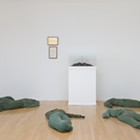Sure, Crazy for You — a 1992 rewrite of a 1930 New York musical — is less concerned with matters of plot and character than with finding excuses to sing a bunch of Gershwin songs. But with songs like these, who could ask for anything more?
Seventy-five years ago, Girl Crazy — with music by George Gershwin and lyrics by his brother Ira — opened on Broadway with its story of a wealthy Manhattan man who, fed up with his playboy son, ships the kid off to college in Arizona. After falling for a pretty but uninterested local girl, the son saves the college from ruin, gets the girl — and helps a lot of other fellows get their girls — by devising a swell plan: Hey, kids, let's make the college coed! And while we're at it, let's put on a show!
The Judy Garland-Mickey Rooney movie of 1943 made that kind of bubbly enthusiasm infectious. But when Ken Ludwig transformed the show into Crazy for You — using seven of the original 21 songs from Girl Crazy, plus about a half-dozen each from Broadway shows of the 1920s and movies of the '30s — he undercut the "Let's put on a show!" moment. In Crazy for You, Polly is all excited about Bobby Child's plan to save her father's theater until she finds out that Bobby has traveled from New York City to Deadrock, Nev., for the purpose of foreclosing on that same theater.
Romance undercut by realism — it's the mood that typifies the Gershwin songs, and it even characterizes the relationships of both of the musical's romantic couples. Polly has plenty of reasons not to like Bobby, the city boy who arrives in town only to threaten her existence. When Bobby's fiancée Irene shows up in town, she promptly starts trading insults with Lank, the owner of the Deadrock Saloon, played in this production by Josh Mertz.
Mertz sees his character as a combination of Basil Fawlty — "you know, the old John Cleese character who runs a hotel, doesn't want to do anything really, and flies off the handle at a moment's notice" — and Yosemite Sam. Not surprisingly, he and Irene get off to a rough (and even kinky!) start. So why do audiences prefer that stage couples bicker before they fall in love?
"In the movies," says Mertz, "we get a lot of treacly, 'happily ever after' romance, but we all know that's not the case [in real life]. So what you get is the chuckle of familiarity from the audience ... and maybe," he concludes, "that's what love is" — loving one's partner, warts, annoying habits and all.
The Gershwins' songs aren't just collections of sentimental mush. Ira's lyrics continue their appeal because, when it comes to love, they're both idealized and realistic. Polly yearns for her man even though she's lost him: "They're singing songs of love," she intones, "but not for me." Convinced that he's lost out on love, Bobby consoles himself with happy memories ("They can't take that away from me") — but even then, even when he's sentimentally most in love, he still recalls both his girl's attractions ("the way your smile just beams") and her flaws ("the way you sing off-key"). Near the end of the show, "Nice Work If You Can Get It" reminds us that, from the perspective of all the lonely people, the concept of true love doesn't seem empty: "Lovin' who loves you / And then taking that vow / It's nice work if you can get it, / And if you get it, / Won't you tell me how?"
Even when pressed, Mertz couldn't choose between George's melodies and Ira's lyrics. "I can't do it — they're both perfect," he says. "Can I choose an up-tempo number and a ballad? My favorite tune is 'I Got Rhythm,' which has great choreography and a great melody." (Director and choreographer Joey McKneely has replaced the "stomp feel" of Susan Stroman's original choreography for "I Got Rhythm," with music played on a variety of objects, choosing instead to produce it as a tap breakdown, with tappers facing off competitively. "I Got Rhythm" appears twice in this show, as the first-act finale and again during the curtain call.)
"Among the ballads," Mertz goes on, "I have two favorites. First, 'Someone To Watch Over Me' — that's when Polly figures out who Bobby is" — that he has come to foreclose on her father's theater — "and she's feeling lonely.
"She's knocked off her feet," says Mertz. "She likes Zangler," whom she thinks is the actual theater impresario, though it's actually Bobby impersonating the man. "She's a real cowgirl — she stands up to Lank," says Mertz, referring to the character he himself plays. "She won't take any guff from him. But this is when we see her melt a bit — when we see that she's 'more girl than cow,' if I can put it like that."
Mertz says that Kelly Lynn Cosme, who plays Polly, has told him that during the show, "she'll watch out of the corner of her eye, and during 'Someone To Watch Over Me,' she'll see elderly couples put their heads on each other's shoulders, because this was probably the music that was popular when they were courting.
"So it's a good date show — for old people," Mertz laughs, then corrects himself: "No, for everyone."
He's not done counting the show's highlights. "And my second-favorite ballad," he continues, "would have to be 'But Not for Me.' ("A lucky star's above — but not for me. / With love to lead the way / I've found more clouds of gray / Than any Russian play — can guarantee.")
"I mean, anybody who's ever had a broken heart can relate to that," Mertz says. "The music and the lyrics go together so well, it's just one of those perfect songs."
Local audiences must agree, having flocked to Crazy productions in April 1996 at the Opera House and in June 2001 (with Deborah Hansen leading a 17-piece orchestra) at Coeur d'Alene Summer Theater. But with its boy-meets-girl, loses-girl, gets-girl plot — and with half of the "Zangler Follies" improbably showing up in the middle of the Nevada desert — the Gershwins (and their original librettists) evidently weren't too keen on plot plausibility. So isn't Crazy for You simply escapist fluff?
"There are some people — I don't really want to call them 'snobs' — who feel certain types of entertainment aren't valid," says Mertz. "But I come from an off-off-Broadway perspective of doing artsy stuff that nobody ever came to see," he laughs. "So I like the heavy, psychological stuff — but I also like the escapist stuff.
"If you stack this show up against some of those horrible reality TV shows and ask, 'Which is better for our culture?' — entertainment like this with all these gorgeous Gershwin tunes, or one of those reality shows where they're mangling other humans....
"Sure, it's a throwback to a gentler time. But if this is 'just' entertainment, then you can't get any better."
Publication date: 1/06/04
















